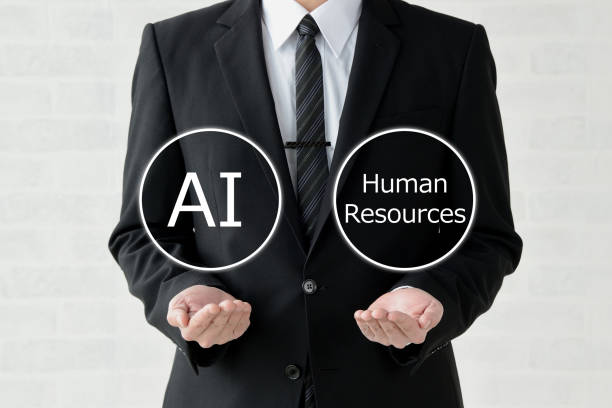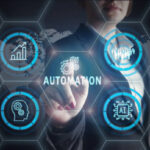Human Resource Management (HRM) has always been crucial in building and maintaining productive workforces. Traditionally, HR functions like hiring, onboarding, employee development, and performance evaluation relied heavily on manual effort. However, the rise of Artificial Intelligence (AI) is transforming HR operations, offering smarter, faster, and more data-driven solutions. AI is not just a passing trend—it is revolutionizing the HR domain by enhancing efficiency, reducing bias, and allowing HR professionals to focus on more strategic tasks.
What is AI in Human Resource Management?
Artificial Intelligence in HR refers to the application of technologies such as machine learning, natural language processing (NLP), robotic process automation (RPA), and predictive analytics to perform tasks that typically require human judgment. These tasks include recruiting, training, performance monitoring, and employee engagement. By leveraging AI, HR departments can automate repetitive tasks, analyze massive amounts of data, and make informed decisions based on real-time insights.
AI in Recruitment and Talent Acquisition
One of the most significant areas where AI is making an impact is recruitment. AI tools can screen thousands of resumes in seconds, identifying the best-fit candidates based on skills, experience, and other parameters. AI-powered chatbots handle initial interactions with candidates, answering questions, collecting information, and scheduling interviews. This leads to a faster hiring process, a better candidate experience, and the reduction of unconscious bias in selection. Predictive analytics also plays a key role by forecasting which candidates are more likely to succeed in a given role based on historical data.
Enhancing Onboarding with AI
Once a candidate is selected, AI continues to streamline the onboarding process. Intelligent systems can automatically guide new employees through documentation, compliance forms, company policies, and initial training modules. AI virtual assistants provide real-time support, answering common questions and helping new hires get acclimated to the workplace. This ensures a smooth and engaging onboarding experience, saving time and effort for HR teams.
AI in Performance Management
Traditional performance reviews often lack timeliness and context. With AI, HR departments can access real-time data on employee performance, helping managers make more accurate assessments. AI tools can analyze performance metrics, monitor productivity, and even detect patterns in feedback or behavior that may indicate dissatisfaction or burnout. Additionally, AI can suggest personalized development plans and training opportunities, enabling continuous performance improvement rather than annual evaluations alone.
Personalized Learning and Development
AI is transforming employee learning and development by offering customized training experiences. Adaptive learning platforms use AI to assess an employee’s skills, learning preferences, and goals, then deliver personalized content accordingly. This approach increases engagement and knowledge retention. Moreover, AI can help identify skill gaps and recommend specific programs to address them, ensuring employees remain competitive and aligned with business objectives.
Improving Employee Engagement and Retention
Maintaining employee engagement is essential for reducing turnover. AI tools can monitor employee sentiment by analyzing feedback, emails, surveys, and even social media interactions. Based on this analysis, HR can identify early signs of disengagement or dissatisfaction. Predictive models can then suggest proactive strategies to retain talent, such as offering new roles, promotions, or work-life balance improvements. These interventions help improve job satisfaction and foster a positive workplace culture.
Strategic Workforce Planning
AI supports strategic HR decisions by providing actionable insights through workforce analytics. It can forecast future hiring needs, track diversity metrics, optimize team structures, and support succession planning. These predictive capabilities allow organizations to plan effectively, allocate resources wisely, and stay prepared for market fluctuations or growth opportunities. AI helps HR align workforce strategies with long-term business goals.
Payroll and Benefits Administration
AI significantly simplifies payroll processing and benefits management. Automated systems can calculate salaries, apply tax rules, and ensure timely payments with minimal human intervention. AI chatbots also assist employees in understanding and enrolling in benefit programs. Additionally, AI tools detect anomalies or inconsistencies that may indicate fraud or compliance issues. This improves accuracy, saves time, and ensures organizations remain compliant with labor laws and regulations.
Technologies Powering AI in HR
Several core technologies power the AI revolution in HR. Machine Learning (ML) enables systems to learn from data and improve over time. Natural Language Processing (NLP) allows machines to understand and interact using human language, which is essential for chatbots and sentiment analysis. Robotic Process Automation (RPA) automates repetitive tasks like document processing. Predictive analytics forecasts trends and helps HR make proactive decisions. Together, these technologies drive innovation across all HR functions.
Benefits of AI in Human Resource Management
The integration of AI into HR brings multiple advantages. It improves efficiency by automating manual processes and saving time. It enhances decision-making by providing data-driven insights. AI also reduces bias in hiring and promotions by standardizing evaluations. It improves employee experience through personalized engagement and support. Furthermore, AI reduces operational costs and frees up HR professionals to focus on strategic initiatives like talent development and organizational culture.
Challenges and Ethical Considerations
Despite its many benefits, implementing AI in HR presents several challenges. One major concern is algorithmic bias—if AI systems are trained on biased data, they may reinforce existing prejudices. Organizations must ensure that training data is diverse and regularly audited. Another concern is privacy, as AI often handles sensitive employee data. Companies must comply with regulations such as GDPR and CCPA and prioritize data security. Additionally, the lack of transparency in AI decision-making can create distrust. Adopting explainable AI models and maintaining open communication with employees can help address this issue. Finally, while AI automates many tasks, it also raises concerns about job displacement. However, rather than replacing HR professionals, AI is expected to augment their roles, making upskilling and adaptation essential.
Real-World Applications of AI in HR
Several leading companies have successfully integrated AI into their HR practices. Unilever uses AI for screening candidates through digital interviews and gamified assessments. IBM has developed tools that predict employee attrition with over 90% accuracy, allowing proactive retention efforts. Hilton uses AI chatbots to streamline candidate communication and interview scheduling, significantly improving hiring speed and efficiency. These examples demonstrate the tangible benefits AI brings to HR operations.
The Future of AI in HR
Looking ahead, AI will become even more integral to HR management. Future developments may include Emotion AI that gauges employee well-being through facial and voice recognition, blockchain-based systems for secure employee records, and more sophisticated personalization in learning and development. As AI evolves, it will empower HR departments to become more agile, proactive, and people-focused. The focus will shift from automation alone to creating a more human-centered work environment enhanced by intelligent technologies.
Conclusion
Artificial Intelligence is reshaping Human Resource Management by enhancing operational efficiency, improving decision-making, and enabling personalized employee experiences. Rather than replacing HR professionals, AI acts as a powerful ally—automating routine tasks and allowing HR teams to concentrate on strategic priorities. By embracing AI responsibly, addressing ethical concerns, and investing in upskilling, organizations can create smarter, more inclusive, and resilient HR ecosystems. In the evolving world of work, AI is not a threat but a transformative opportunity to build better workplaces for everyone.


